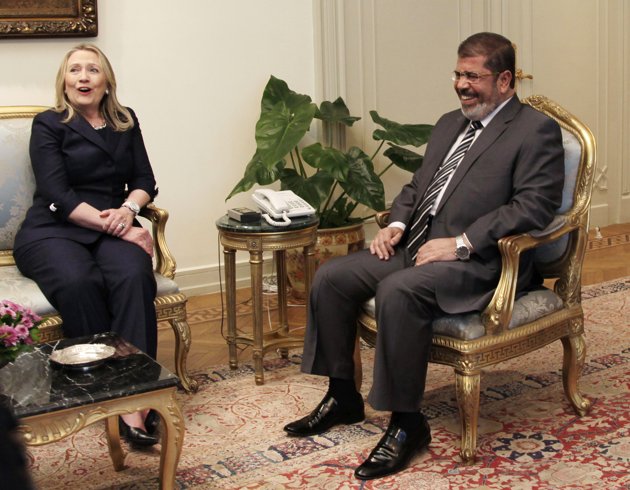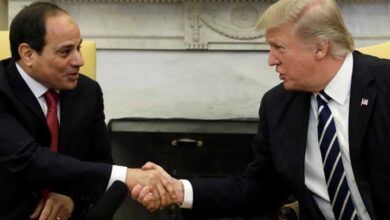
The Court of Cassation's announcement that ruling on the decision to dissolve the People's Assembly is not within its jurisdiction, Hillary Clinton’s meeting with President Mohamed Morsy, and debates concerning the constitution and Egypt's future make up the main content of Sunday’s newspapers.
In what the independent Al-Shorouk newspaper describes as a scoop, sources say ousted President Hosni Mubarak's lawyers and pro-SCAF lawyers were behind the recent supplement to the Constitutional Declaration, which stripped the current president of most presidential powers.
Independent Al-Watan debates holding new presidential elections after the new constitution is written. Tahany al-Gebally, vice president of the constitutional court, says that in the natural course of events, after the constitution is written a new president and parliament should be elected in accordance with its stipulations.
Essam al-Islambolly, a legal expert, believes a new president must be elected after the constitution. But Atef al-Banna, a constitutional expert, says Morsy should complete his presidency to term as he was elected under a constitutional amendment, voted on in 2011, stating the president elected should complete his term. Yehia al-Gamal, another constitutional expert, says whether the president completes his term or not should be stated in the new constitution, as the assembly should add clauses concerning the transitional period. Mohamed El Marghany, another expert, says the current president was elected based on a current constitution.
Party paper Al-Wafd worries about the lack of a vice president, comparing Morsy’s few weeks without a vice president to Mubarak’s 30-year reign without one, suggesting that Morsy's silence on the subject is taking Egypt back to the Mubarak days.
State owned paper Al-Ahram reports that the Cassation Court has refrained from making a decision regarding the dissolution of the People's Assembly. Al-Wafd, in its opposition party fashion, sensationalizes the court decision as an abortion of the Muslim Brotherhood’s evil plans. Islamists had dominated the People's Assembly.
Al-Shorouk details Clinton’s first meeting with Morsy as president. They apparently discussed issues concerning Egypt-Israeli relations and the US insistence on the importance of maintaining cordial relations. The paper links this with Clinton's statement that US President Barak Obama is committed to US economic support for Egypt. Al-Ahram reports on Clinton’s press conference after the meeting, saying Omar Abdul Rahman, an Egyptian imprisoned in the US, was not discussed.
Al-Wafd leads with the dramatic headline, “The she-devil in the presidential palace,” and reports on the protests against Clinton’s visit to Egypt. Its front page article says protestors carried signs saying, “Egypt will not be another Iraq.”
It also writes "Hazem Abu Ismail leaves his followers to protest in the heat while he returns home in the early hours." Former presidential candidate and Salafi leader Abu Ismail and his supporters have been protesting against the supplement to the Constitutional Declaration.
The Brotherhood's party paper Freedom and Justice covers Morsy’s presence at a Police Academy graduation ceremony and his participation in the African Summit. It also shares one headline with Al-Ahram: “Happy news before Ramadan for families of those arrested during the revolution,” as the president’s office promised to investigate those arrested by the military during and since the 25 January uprising within the next 15 days.
A column in Al-Shorouk by Emad Eddin Hussien lauds Tunisian president Monsif al-Marzouki under the headline, “Imagine, a president and intellectual.” Hussein says his meeting with Marzouki was filled with discussion about well-known artists, writers and philosophers. He describes this as unusual for an Arab president, but a refreshing change. He ends his column with a question he posed to Tunisian Prime Minister Rachid al-Ghanoushy: “Care to trade some Brotherhood leaders?”
Al-Watan reports that Tunisian social media users scoffed at Marzouki’s poor reception in Egypt, suggesting that even foreign counterparts don’t consider him a legitimate president.
Al-Ahram runs a feature on women and Christians. Women, although an integral part of the revolution, haven’t had the proper chance to participate in Egypt’s new era, it says, but Christians are feeling more comfortable since Islamic institution Al-Azhar decided the second constitutional clause, which concerns Sharia law, remain as is.
Freedom and Justice publishes a one-page feature on corrupt media, stating that media funding must be investigated. It gives an academic lesson on media ethics and describes honest media as that which represents opposing opinions. It calls on readers and viewers to distinguish between opinion and fact.
Egypt’s papers:
Al-Ahram: Daily, state-run, largest distribution in Egypt
Al-Akhbar: Daily, state-run, second to Al-Ahram in institutional size
Al-Gomhurriya: Daily, state-run
Rose al-Youssef: Daily, state-run
Al-Dostour: Daily, privately owned
Al-Shorouk: Daily, privately owned
Al-Watan: Daily, privately owned
Al-Wafd: Daily, published by the liberal Wafd Party
Youm7: Daily, privately owned
Al-Tahrir: Daily, privately owned
Freedom and Justice: Daily, published by the Muslim Brotherhood's Freedom and Justice Party
Sawt al-Umma: Weekly, privately owned
Al-Arabi: Weekly, published by the Nasserist Party
Al-Nour: Official paper of the Salafi Nour Party




